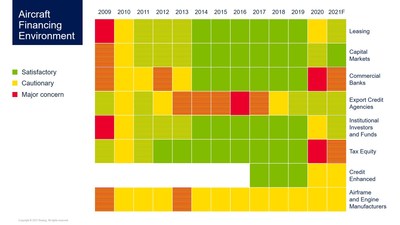CHICAGO, April 14, 2021 /PRNewswire/ -- Boeing [NYSE: BA] projects global and diversified funding will continue to flow into the aircraft financing sector as the aviation sector navigates the global pandemic and vaccine deployment continues to accelerate.
"Financiers and investors understand the industry's resilience and the long-term fundamentals that make aircraft a valuable asset class," said Tim Myers, president of Boeing Capital Corporation. "Despite the unprecedented impacts of COVID-19 on the global aerospace industry, there generally continues to be liquidity in the market for our customers, and we expect it to further improve as travel begins to rebound."
The 2021 Current Aircraft Finance Market Outlook (CAFMO), the first published since 2019, reflects Boeing's near-term view of market dynamics and assesses financing sources for new commercial airplane deliveries. Due to the ongoing impacts of the pandemic, the 2021 CAFMO excludes its customary one- and five-year industry financing projections.
"Industry fundamentals continue to show varying degrees of strength in different markets depending on the regional trends of the global pandemic," Myers said. "We expect that capital will continue to be routed into the sector by established players and as new entrants seek opportunities during the industry's recovery."
The 2021 CAFMO reports the aircraft financing environment ended 2020 with enough liquidity to finance deliveries, but with stresses particularly in the bank debt and tax equity markets. The 2021 CAFMO, an introductory video and regional financing data is available at www.boeing.com/CAFMO. Select highlights include the following:
- At the industry level, commercial aircraft delivery funding volume totaled $59 billion, a 40% decrease from 2019 levels.
- The top sources of Boeing delivery financing were cash, bank debt and capital markets, and 100% of Boeing deliveries were financed by third parties.
- Aircraft lessors executed a significant volume of sale-leaseback transactions, and the industry-wide leased fleet climbed to 46%.
- Capital markets for aviation volumes were 70% higher than 2019.
- Commercial banks shored up the aviation industry's need for liquidity early in the pandemic, but long-term bank debt became one of the less utilized forms of financing.
- Institutional investors and funds continued to seek aviation exposure, stepping up as some financiers paused and sector credit spreads widened.
- Export credit agencies remain a small but important funding source during the pandemic.
- Credit-enhanced financing saw further progress as a complementary funding source, totaling to 4% of the financing mix for Boeing deliveries.
The Boeing 2020 Commercial Market Outlook, a separate annual 20-year forecast addressing the market for commercial airplanes and services, projects passenger traffic growth at an average rate of 4% per year. The global commercial fleet is expected to reach 48,400 by 2039, up from 25,900 airplanes today.
Caution Concerning Forward-looking Statements
Certain statements in this document may be "forward-looking" within the meaning of the Private Securities Litigation Reform Act of 1995. Words such as "may," "should," "expects," "intends," "projects," "plans," "believes," "estimates," "targets," "anticipates" and similar expressions generally identify these forward-looking statements. Examples of forward-looking statements include statements relating to our future plans, business prospects, financial condition and operating results, as well as any other statement that does not directly relate to any historical or current fact. Forward-looking statements are based on expectations and assumptions that we believe to be reasonable when made, but that may not prove to be accurate. These statements are not guarantees and are subject to risks, uncertainties and changes in circumstances that are difficult to predict.
Many factors could cause actual results to differ materially and adversely from these forward-looking statements, including the COVID-19 pandemic and related industry impacts; the 737 MAX, including the timing and conditions of 737 MAX regulatory approvals, lower-than-planned production rates and/or delivery rates, and increased considerations to customers and suppliers; economic conditions in the United States and globally; general market and industry conditions as they may impact us or our customers; reliance on our commercial customers, our U.S. government customers and our suppliers; the overall health of our aircraft production system, as well as the other important factors disclosed previously and from time to time in The Boeing Company's filings with the Securities and Exchange Commission. Any forward-looking statement speaks only as of the date on which it is made, and we assume no obligation to update or revise any such statement, whether as a result of new information, future events or otherwise, except as required by law.
Boeing is the world's largest aerospace company and leading provider of commercial airplanes, defense, space and security systems, and global services. As a top U.S. exporter, the company supports commercial and government customers in more than 150 countries and leverages the talents of a global supplier base. Building on a legacy of aerospace leadership, Boeing continues to lead in technology and innovation, deliver for its customers and invest in its people and future growth.
Boeing Capital Corporation is a global provider of financing solutions. A wholly-owned subsidiary of The Boeing Company, Boeing Capital offers asset-backed lending and leasing, concentrating on assets that are critical to the core operations of Boeing customers. Boeing Capital's primary mission is to support the other Boeing business units by ensuring customers have the financing they need to buy and take delivery of their Boeing products.
Contact:
Peter Pedraza
Boeing Communications
1-312-618-8998
peter.p.pedraza@boeing.com
SOURCE Boeing

 USA
USA


